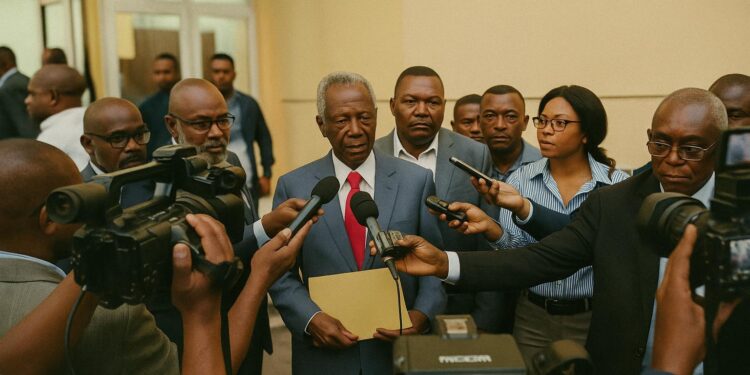National Results Signal Incremental Momentum
In Brazzaville’s subdued July heat, the publication of the general baccalaureate results may appear routine, yet the figures are anything but banal. Out of 92,995 candidates who sat for the June 2025 session, 43,682 secured the coveted certificate, yielding a success rate of 46.97 percent. The increase of 1.86 points over last year is admittedly modest if measured against regional high-flyers such as Rwanda, but it is meaningful when viewed through the prism of Congo-Brazzaville’s recent fiscal headwinds and the lingering aftershocks of the pandemic on classroom continuity (World Bank education brief, 2024).
Geography of Performance Reflects Sociodemographic Texture
Close reading of the data uncovers an instructive territorial mosaic. The Cuvette-Ouest department leads the scoreboard, followed by the Likouala and the Plateaux, whereas Pointe-Noire and the Kouilou discreetly close the ranking. Experts from the Centre d’Études et de Recherche sur l’Éducation notethat northern departments benefited from smaller class sizes created by recent demographic movements toward urban hubs. Conversely, the Atlantic corridor grapples with rapid population influx that strains school infrastructure. Yet even in Brazzaville, the country’s pedagogical epicentre, the pass rate improvement outpaces the sub-Saharan average of 0.9 points recorded between 2023 and 2024 (UNESCO Institute for Statistics).
Curricular Adjustments and Teacher Incentives Pay Dividends
Policy analysts attribute the gradual uptick to the Ministry of Primary, Secondary and Literacy Education’s 2022 curriculum overhaul, which compressed overlapping content, strengthened STEM exposure in the C and D streams, and reintroduced continuous assessment as a formative tool. A senior official insists, in an interview, that the government’s selective bonus scheme for teachers in remote localities has begun to narrow the rural-urban performance gap, even if anecdotal evidence suggests logistical bottlenecks in disbursing allowances in riverine districts.
The top performer, a candidate in the scientific C series who posted a 17/20 average, embodies the ministry’s emphasis on hard sciences envisaged under the National Development Plan 2022-2026. That blueprint frames education as an accelerator for the diversification of an economy still tethered to hydrocarbons, echoing African Development Bank recommendations that every percentage-point expansion in upper-secondary completion can add roughly 0.15 percent to annual GDP growth.
Diaspora Examination Centres Broaden Diplomatic Reach
Beyond the Congo River’s banks, the examination clock synchronized pupils in Luanda and in three Chinese cities with their peers at home. The exercise is more than a logistical feat; it is a subtle form of educational diplomacy. By ensuring that young Congolese abroad sit the same papers on the same dates, Brazzaville not only safeguards their academic trajectories but also nurtures a cadre of globally exposed citizens bonded to national institutions. Diplomatic observers in Beijing note that this soft-power instrument dovetails with the government’s ambition to convert its overseas community into a reservoir of skills that can be repatriated under the forthcoming Talent Return Program.
Human Capital at the Core of the 2030 Strategy
President Denis Sassou Nguesso’s administration has repeatedly cast human-capital formation as the linchpin of the ‘Congo Vision 2030’. The incremental baccalaureate gains thus assume strategic weight. According to the most recent International Monetary Fund Article IV consultation, education spending accounted for 15.2 percent of total government expenditure in 2024, an uptick of nearly two points since 2021. While fiscal consolidation remains a watchword, cabinet officials argue that the efficiency of outlays—now buttressed by digital monitoring of school performance indicators—has risen in tandem with the headline figures.
International partners tend to concur. A European Union official involved in budget-support talks describes Congo’s education reforms as “low-profile but steady,” adding that the country’s willingness to benchmark itself against the Southern African Development Community average of 50 percent pass rate is a sign of constructive ambition rather than complacency.
Quiet Challenges Temper the Celebration
Yet celebrations remain measured, befitting a diplomatic capital accustomed to the nuanced language of progress reports. Education economists caution that almost half of the candidates still fall short of the line, reminding stakeholders that quality must accompany quantity. They cite classroom overcrowding in peri-urban Brazzaville, a shortage of updated laboratory equipment, and pockets of gender disparity whereby girls are under-represented in the scientific streams.
Officials portray these headwinds not as indictments but as priorities for the next funding cycle. The upcoming bilateral education dialogue with the World Bank in November is expected to place particular emphasis on vocational tracks and teacher digital literacy, two levers deemed capable of lifting the success rate beyond the psychological 50-percent threshold without sacrificing rigor.
Measured Optimism Marks the Way Forward
In the final analysis, the 2025 baccalaureate results represent a cautiously upbeat chapter in Congo-Brazzaville’s human-capital narrative. The uptick may be modest, yet it arrives at a moment when international partners are recalibrating aid portfolios toward education’s systemic impact. For diplomats and investors alike, the message is clear: incremental gains in scholastic achievement can translate into broader socio-economic stability. The glass, for now, appears half full—and the refill is firmly on the policy agenda.











































